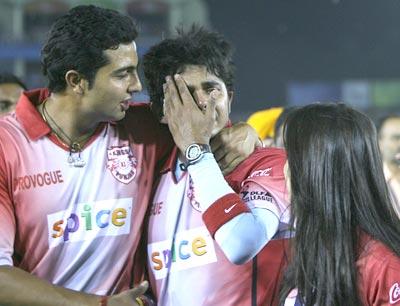And here’s the WTF headline of the day:
(Link via email from MadMan.)
The Times of India reports:
In a grotesque incident, three educated sons of a UP Power Corporation engineer, along with a cousin, punched, kicked and beat their mother to death with a rod late on Saturday night believing that she had been possessed by the spirit of a dead relative.
The bizarre violence didn’t end there. The foursome then tried to “sacrifice” a sister-in-law in an attempt to bring their dead mother back to life. They also beat up and injured their sister, her husband, the husband’s father and two sisters, when they tried to intervene. […]
As news of the violence spread, several hundred residents rushed to the police station to get a glimpse of the “butchers of Vijaynagar”. Some agitated residents demanded they be allowed to lynch the culprits.
To me, the worst part of this story is the last line I’ve quoted above. While superstition is rampant in our country, such incidents of madness are thankfully rare. But lynching, on the other hand, has become commonplace, almost a sort of mob entitlement. It demonstrates both a belief that justice will otherwise not be done on those the mob plans to lynch, and confidence that the mob won’t face justice either. That’s a lousy justification, as almost any justification for violence is, but a powerful explanation. And there doesn’t seem to be much hope of improvement.
A man starts abusing his daughter sexually when she is 11. A few years later, he lures her to “a windowless basement” and imprisons her there. He fakes a letter from her that indicates that she has run away from home. Then, for 24 years, he keeps her in that basement, rapes her repeatedly, and has seven children with her. One of them dies after birth. Three are taken to the man’s home, where he pretends that his ‘runaway’ daughter has abandoned them, and are adopted by him and his wife. The oldest two, now aged 18 and 19, and the youngest, aged 5, remain in the basement, where they are denied sunlight, friends, the normal life above the ground. Eventually the oldest daughter falls ill, has to be taken to hospital, and the story unravels from there. You can read about it here.
This reminds me of something Theodore Dalrymple once wrote: “Men commit evil within the scope available to them.” This man’s scope was limited to his own family—but such damage is bone-chilling. I hope they lock him away for the rest of his life—though nothing he faces can equal what he made his daughters go through—but the difficult question here is not what is to be done with him, but what is to be done with us.
Nitin Pai, teeming with generosity, emails me this marvellous advertisement:

I’m sure some applicants would begin their applications with the words, “I have heard that there is a vacancy…”
This is surely the WTF headline of the year so far:
Incredible India! Infants thrown off roofs to thank God
Here’s the video. Watch it, it’s astonishing.
And here’s the WTF quote of the piece, from “deputy sarpanch of Musti village, Ravikiran Mehta”:
People have been following this tradition for almost 500 years now. They believe that if they throw the child from the roof then it does good to him or her.
I have a theory for how this tradition came to exist. Centuries ago, some village patriarch went mad and started throwing kids off the roof. The kids got brain-damaged in the process, and continued the tradition when they became parents, causing the next generation to also become brain-damaged. And so on. What else can explain such lunacy?
But wait, there’s more. The last (terribly ungrammatical) sentence of the report says:
Both Muslim and Hindu families take part in this ritual, however the state administration chooses not to interfere and provides heavy police security during the ritual every year.
Yes, the cops don’t protect the kids—they protect the idiots throwing them off a roof. If I pinch myself any more the mosquitoes will go on strike.
(Link via separate emails from vinjk and Mahendra Shikaripur.)
Update: I’d embedded the video on this page, but it kept making a pop-up ad open when this page was refreshed. I hate pop-ups, and would hardly want to inflict such inconvenience on my readers, so I’ve changed that to a link.
Update 2: Krishna Prasad writes in pointing me to his post last year about a similar ritual in North Karnataka. Ah, tradition!
The picture of the day is by David Kadlubowski of the New York Times; it forms part of a slideshow on nude vacations—or ‘nakations’.
I love the composition of the picture, but find the hiding of body parts hilariously contrived. In a slideshow about nude vacations, why be priggish about the body?
Vikram Doctor writes in regarding my post on BAN Ki-moon:
This seems to be a particular problem with Korean politicians – there was the foreign minister who everyone was careful to spell Lee Beom Seok to hide the fact that it was pronounced Lee Bum Suk.
I wonder if there are other nationalities particularly prone in this way. A friend in Bangalore had an Estonian boss called Mr Penes which I was told is a common Estonian name. The good TamBrahms in the office were too embarrassed to use the name until they hit on the excellent tactic of calling him Mr Mahalingam!
Well, I suppose Anurag Dikshit would empathize.
Check out this beautiful passage from Thornton Wilder’s “The Bridge of San Luis Rey”, a novel set in early-18th-century Peru:
The Abbess was one of those persons who have allowed their lives to be gnawed away because they have fallen in love with an idea several centuries before its appointed appearance in the history of civilization. She hurled herself against the obstinacy of her time in her desire to attach a little dignity to women. At midnight when she had finished adding up the accounts of the house she would fall into insane visions of an age when women could be organized to protect women, women travelling, women as servants, women when they are old or ill, the women she had discovered in the mines of Potosi, or in the workrooms of cloth merchants, the girls she had collected out of doorways on rainy nights. But always the next morning she had to face the fact that the women in Peru, even her nuns, went through life with two notions: one, that all the misfortunes that might befall them were merely due to the fact that they were not sufficiently attractive to bind some man to their maintenance; and, two, that all the misery in the world was worth his caress. She had never known any country but the environs of Lima, and she assumed that its corruption was the normal state of mankind. Looking back from our century we can see the whole folly of her hope. Twenty such women would have failed to make any impression on that age. Yet she continued diligently in her task. She resembled the swallow in the fable who once every thousand years transferred a grain of wheat, in the hope of rearing a mountain to reach the moon. Such persons are raised up in every age; they obstinately insist on transporting their grains of wheat and they derive a certain exhilaration from the sneers of bystanders. ‘How queerly they dress!’ we cry. ‘How queerly they dress!’
I wonder if, in 2308 AD, this is how they’ll speak of today’s libertarians. How queerly we dress!

Compared to Indian hockey, cricket in India lives up to the cliché of being a gentleman’s game: at least players don’t hit each other, as in common in the sport KPS Gill destroyed. However, Harbhajan Singh seems to have forgotten which sport he was playing yesterday. NDTV reports:
Mumbai Indians captain Harbhajan Singh and Kings XI paceman S Sreesanth were on Friday involved in a bitter row, following which the fast bowler was seen crying bitterly on the ground at the end of their IPL match here.
Harbhajan allegedly slapped Sreesanth after the paceman said something to Harbhajan which offended the off-spinner.
Sources close to [Sreesanth] said that after the match a smiling Sreesanth walked up to Harbhajan – the captain of the losing Mumbai Indians – and said “Hard luck”. “That was enough for Harbhajan to lose his cool and hit Sreesanth under the eye,” said sources close to the fast bowler.
‘Sources close to Sreesanth’ would generally be Sreesanth himself, but I could be wrong. Both the players involved are characters—Sreesanth’s an immature buffoon, Bhajji’s an unmannered lout—but regardless of whether Sreesanth really said something as innocuous as “hard luck,” Harbhajan deserves to have his ass kicked by the authorities. Hitting fellow players just isn’t on, and if they set a precedent of non-punishment, Andrew Symonds and Matthew Hayden might just get wicket wicked ideas.
And really, how could they have made Harbhajan captain of Mumbai Indians? I’d put VVS Laxman down as being the worst captain of the IPL so far, but Harbhajan seems to have brought an extra dimension to the job. Maybe he has a future in parliament.
(NDTV link via email from S Jagadish. Picture courtesy Rediff, who caption it: “India pacer S Sreesanth sheds tears of joy after the Punjab team finished with a 66-run victory.” Eh?)
Update: Rediff’s changed their caption!
The website linked below demonstrates how a free market can satisfy the unlikeliest of niches:
http://www.pornfortheblind.org/
If your computer’s volume is turned up, this might be NSFW.
(Link via email from Gautam.)